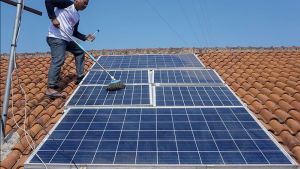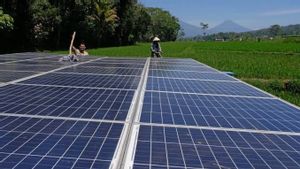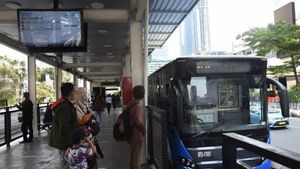
JAKARTA - The Ministry of Energy and Mineral Resources (ESDM) has issued a revision of the Ministerial Regulation (Permen) regarding the Roof Solar Power Plant (PLTS).
The regulation stated in the Minister of Energy and Mineral Resources Regulation (Permen) Number 2 of 2024 concerning Roof Solar Power Plants Connected to the Electricity Network that Holds Electric Power Supply Business Permits for Public Interest
One of the rules signed on January 29 states that the excess supply of Rooftop PLTS cannot be sold to PT PLN (Persero).
In the regulation signed on January 29 last year, the net-metering scheme was abolished so that excess electricity or electricity exports from users to PT PLN (Persero) could not be calculated as part of the reduction of electricity bills.
"The excess of electrical energy from the Rooftop PLTS system that enters the IUPTLU holding network is not taken into account in determining the number of electricity bills for Roof PLTS customers," reads article 13 of the regulation.
In this regard, the Secretary General of the Ministry of Energy and Mineral Resources (ESDM) Dadan Kusdiana said that one of the points being revised was to remove the export policy of electricity imports from PLTS Roof users to PLN. However, he ensured that the government would continue to provide incentives to customers.
관련 항목:
"There is no import export, but consumers who installed the Roof PLTS were not charged. There were (previously) standard costs and so on, that was no longer there. That was an incentive," Dadan told the media crew when met at the Ministry of Energy and Mineral Resources Building, Friday, February 23.
Dadan admitted that the latest Roof PLTS rules are not suitable for household users because there is no electricity import export policy to PLN. For this reason, the Roof PLTS is considered more suitable for industrial scale use.
"In terms of household capacity, it will be small. Unless you use the battery in the house so it is stored for use at night. But for industries that have a baseload, the industry, from morning to evening, the electricity consumption is relatively stable. So that's where it will be," concluded Dadan.
The English, Chinese, Japanese, Arabic, and French versions are automatically generated by the AI. So there may still be inaccuracies in translating, please always see Indonesian as our main language. (system supported by DigitalSiber.id)














